Top 10 Entrepreneurs in India
Introduction
Entrepreneurship is defined as the process of producing or extracting value. According to this definition, entrepreneurship is "a process of change that requires higher risk than is commonly associated with starting a business and may have objectives other than financial ones."
An entrepreneur is an individual a company and bears the majority of the risks while receiving the majority of the benefits. Entrepreneurship is the term used to describe the process of starting a firm. Typically, the entrepreneur is portrayed as a trailblazer, ushering new ideas, products, services, and/or business practices to market.
The "capacity and willingness to design, organize, and execute strategies, as well as any risks involved with them, in order to produce a profit," or the "process of developing, establishing, and launching a firm, which is typically similar to a small business," have been classified as entrepreneurship. Entrepreneurs are the individuals who start these businesses.
While most definitions of entrepreneurship engage in the process of starting and running a business, many start-ups fail due to the high risks involved in doing so, which include "lack of funding, government policies, poor business decisions, a lack of market demand, an economic downturn, or a combination of all of these."
Entrepreneurs devote their time, energy, and resources to adding value to the lives of others. They get compensated for their work, which helps both the product's user and the business owner.
The entrepreneur is a factor, and the study of entrepreneurship dates back to Richard Cantillon and Adam Smith's work in the late 17th and early 18th centuries. Entrepreneurship, on the other hand, was generally ignored philosophically until the late nineteenth and early twentieth centuries, and practically until the late 1970s, when it saw a huge resurgence in business and economics.
Austrian economists such as Carl Menger, Ludwig von Mises, and Friedrich von Hayek, as well as other Austrian economists such as Ludwig von Mises, Carl Menger, and Friedrich von Hayek, influenced our understanding of entrepreneurship in the 1930s. An entrepreneur, according to Schumpeter, is somebody who is motivated and capable of converting a new idea or concept into a viable business. Entrepreneurship employs Schumpeter's "whirlwind of creative destruction" to eliminate substandard ideas in whole or in part across markets and industries while simultaneously developing new items and business models.
According to this viewpoint, creative destruction is significantly responsible for industry dynamism and long-term economic progress. One explanation of the remnant in endogenous growth model is that entrepreneurship promotes economic growth, which is a disputed topic in academia. As according Israel Kirzner, the majority of advances will be far more gradual, such as the replacement of paper and plastic in the manufacturing of drinking straws.
Opportunities for entrepreneurship can be exploited in a number of different ways as follows
- Creating a business strategy
- Recruiting personnel
- Obtaining monetary and material resources
- Taking the initiative
- Being in charge of the venture's success or failure.
- Aversion to danger
In India, entrepreneurship has a longstanding experience, but it has its unique personality. Rather than launching technical enterprises, many Indian entrepreneurs began from humble beginnings and developed conglomerates that were passed down through the generations as family businesses. That's not to say that aspiring Indian entrepreneurs won't focus on technology and benefit to the country's economic growth.
However, we must keep in mind that the GDP per capita in this country of over 1 billion people is just $1,900 per year, suggesting one of the highest rates of economic disparity in the world. India is the world's biggest democracy and an emerging market that is rapidly developing.
While many people in India continue to live in extreme poverty, there are also a handful of well-known and wealthy Indian entrepreneurs and businessmen. In India, entrepreneurship and business have a lengthy history that dates back to the early twentieth century.
1. Ritesh Agarwal
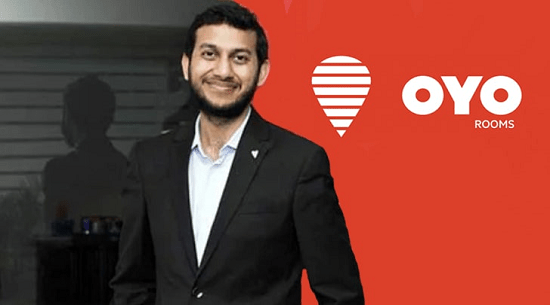
Company - OYO Rooms
History of Start-up
Ritesh Agarwal founded OYO rooms in 2015. He got the TiE – Lumis Entrepreneurial Excellence Award (2014), was the first Asian to get the Thiel Fellowship '20 under 20' (2013), was named one of TATA First Dot Awards' top 50 entrepreneurs (2013), and became the world's youngest CEO at the age of 17. Ritesh Agarwal, an Orissa native from a merchant family, went to Kota to study engineering. But, unlike other JEE candidates, his zeal got the better of him, and he forgot to study for the exam. Instead, he published "Indian Engineering Colleges: A Complete Encyclopaedia of Top 100 Colleges," which became an instant bestseller on Flipkart.
He was only 16 years old when he was chosen for the Asian Science Camp at the Tata Institute of Fundamental Research (TIFR). Ritesh, who enjoys touring and has lodged in a range of hotels, has observed a reoccurring problem in the places he has visited: the high cost of the hotel room was unrelated to the services provided. He concluded that the most of hotels in India couldn't even meet a budget traveler's fundamental demands.
As a result, he established Oravel Stays, his first commercial venture, in 2012. Oravel was renamed "OYO," which stands for "ON YOUR OWN," after he changed his business strategy. Ritesh Agarwal became one of India's a very well entrepreneurs thanks to OYO.
2. Shradha Sharma
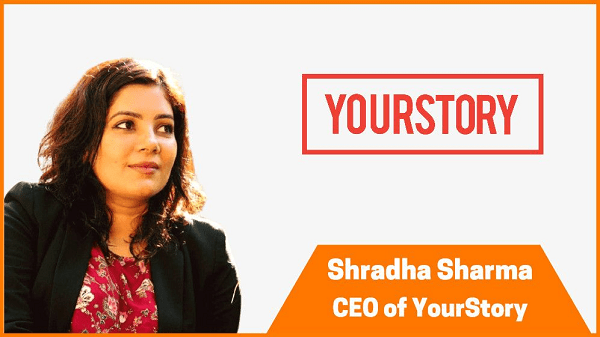
Company – YourStory
History of Start-up-
While working for mainstream media outlets such as the Times of India and CNBC, Shradha Sharma, an epitome of courage and knowledge, was at the top of her profession (Mumbai). Through her time with these groups, she saw that no one was interested in promoting and expose the stories of entrepreneurs, whether successful and unsuccessful. She realised there are millions of stories floating around but no mechanism to share them with the public. Shradha came up with the idea for YourStory, an online network where entrepreneurs can share their stories and other relevant information.
Since its debut in 2008, YourStory has assisted in the publication of over 70,000 articles. Shradha Sharma leads a team of over 100 people that work together to generate information in 11 Indian languages. The purpose of YourStory is to give a voice to the emotional roller coaster that each entrepreneur goes through. Shradha Sharma was designated one of the Top 500 LinkedIn Influencers in the World and got the L'Oreal Paris Femina Award. She is among India's best-known female businesswomen.
3. Bhavish Aggarwal
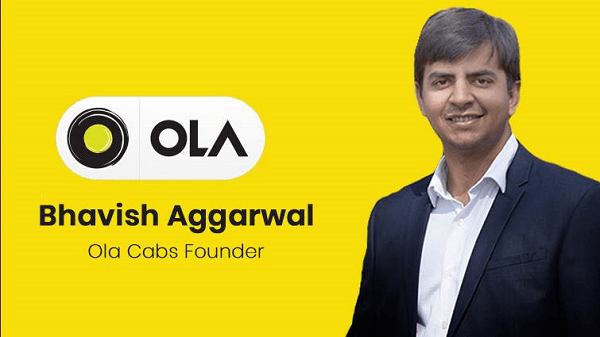
Company - Ola Cabs
History of Start-up
Bhavish Aggarwal, an IIT Bombay alumnus, and Ankit Bhati co-founded Ola Cabs, India's leading cab aggregator. He was recognised to IAMAL's Best Startup of the Year list and Forbes' 30 Under 30 list after winning the Billionth prize in 2013. Bhavish revolutionised India's cab-hailing industry by utilising smartphones. Ola Cabs was different from other cab services at the time since it used smartphones and GPS technology to allow consumers to order cabs from anywhere and at any time.
Bhavish Aggarwal left a well-paying position at Microsoft to work for Ola Cabs. No one believed in his concept, but his unwavering determination, resilience, and willingness to take risks catapulted him to the top of the achievement ladder. Bhavish Aggarwal is an entrepreneur who has made a name for himself in India.
4. Vijay Shekhar Sharma
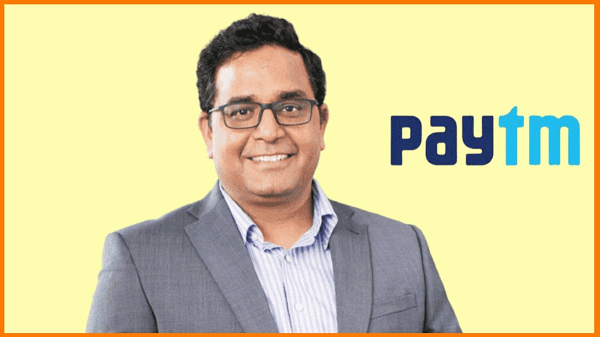
Company – Paytm
History of Start-up
Paytm, India's premier digital payment platform, was founded by Vijay Shekhar Sharma. Vijay was born and raised in Aligarh. Vijay, a Delhi College of Engineering alumnus, worked on a variety of projects and for a small company before electing to start his own company. He put up USD 2 million to get One97 up and running.
One97 is Paytm's parent firm. Thanks to the payment platform, Indians now have connected to a mobile wallet, the option to make payments using QR codes, easier bill payments, and much more.
As a result of these attributes, Paytm's popularity soared. In this way, Vijay Shekhar Sharma has become an inspiration to budding entrepreneurs all over the world.
5. Deepinder Goyal and Pankaj Chaddah
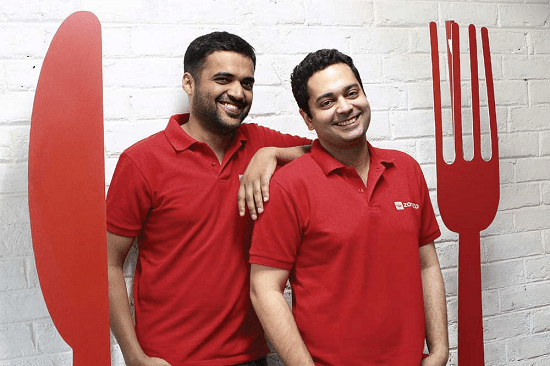
Company – Zomato
History of Start-up-
Deepinder Goyal and Pankaj Chaddah launched Zomato, which revolutionised the Indian food delivery sector. The two are IIT Delhi graduates. Zomato debuted in Delhi under the moniker 'Foodiebay.'
It was then expanded to encompass Mumbai and Kolkata as well. There isn't a single place in India where Zomato doesn't have a presence. Zomato's USP is its mobile app, which has an incredible user interface and allows you to order food from your favourite restaurant/eatery while also making secure payments.
6. Kunal Shah

Company – CRED
History of Start-up
Kunal Shah earned a Bachelor of Arts in Philosophy from Wilson College in Mumbai and shortly enrolled Narsee Monjee Institute of Management Studies prior to actually dropping out. Paisaback, Shah's first commercial venture, provided cash-back discounts to organised stores.
Kunal Shah and Sandeep Tandon are the founders of Freecharge, one of India's most innovative company models. CRED is Shah's second business venture, following the $400 million sale of Freecharge to Snapdeal in 2015. He is without a doubt one of the most well-known businessmen in India.
7. Binny Bansal and Sachin Bansal
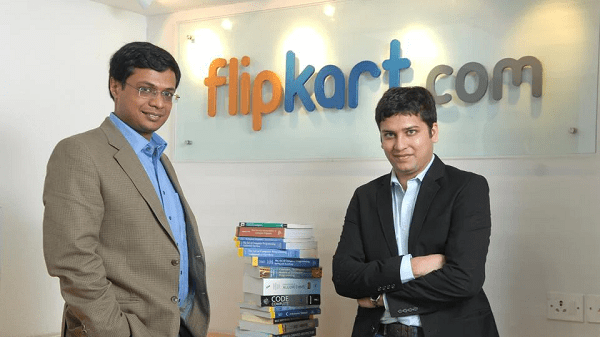
Company- Flipkart
History of Start-up
Flipkart was founded by Sachin Bansal and Binny Bansal. Because of Flipkart, India's e-commerce market has changed dramatically. While looking for products on Amazon's online shop, Sachin and Binny discovered inconsistencies.
The duo realised that their e-commerce initiative's USP would be quick product delivery, supplemented with a simple user experience that took advantage of the latest technologies. Following Walmart's acquisition of Flipkart in 2018, both founders have stood down from their positions at the company. Flipkart is still putting up a fight against all other e-commerce platforms and winning the hearts of Indians.
8. Deep Kalra

Company – MakeMyTrip
History of Start-up
MakeMyTrip was founded by Deep Kalra. Deep Kalra deserves credit for the advent of internet train reservations in India. Deep worked for GE Capital and ABN AMRO bank after graduating from St. Stephen's College and earning an MBA from IIM Ahmedabad. The office culture and 9-5 work, however, were insufficient to entice him.
Deep Kalra launched MakeMyTrip (formerly known as 'India Ahoy') in the year 2000 with a $2 million investment from eVentures and his co-founders. In August 2010, the company was listed on the NASDAQ. Deep broadened MakeMyTrip by offering hotel bookings once IRCTC joined the race. To mention a few, MakeMyTrip has merged with MyGola, TrulyMadly, and the ITC group.
Deep Kalra is the chair of NASSCOM's Internet Working Group, a member of NASSCOM's Executive Council, and a member of the CII's tourist sub-committee.
9. Byju Raveendran

Company - BYJU'S
History of Start-up
Thousands of students who struggle with courses like math and physics have used BYJU'S to pass the JEE, NEET, and UPSC, among other difficult admission examinations. BYJU'S has commanded the online education industry for quite some time. Byju Raveendran established BYJU'S.
He worked as an engineer for a shipping company before deciding to teach after he offered to help his friends with their CAT exam. Raveendran's friends aced the exam, inspiring him to pursue a career as a full-time educator. Byju Raveendran launched BYJU's with a little initial investment of INR 2 lakhs. The market capitalization of the start-up recently topped $11 billion.
10. Hari Menon
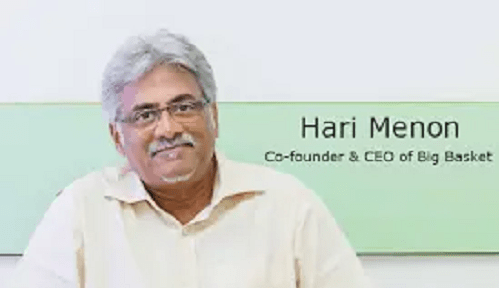
Company – BigBasket
History of Start-up
The concept of a grocery store being delivered to one's door has demonstrated to be a big success over the world. With it, the problem of long queues at the store is no longer a concern. Online grocery purchasing is becoming more popular among Indians as well. And who has been in charge of this market? BigBasket. Hari Menon is the founder of BigBasket.
Having monthly sales of over INR 150 crores, BigBasket has cemented its position as one of the big guns in the Indian e-commerce business. At the moment, Bangalore, Mumbai, Chennai, Delhi-NCR, Hyderabad, Ahmedabad, Pune, and Kolkata are operational.